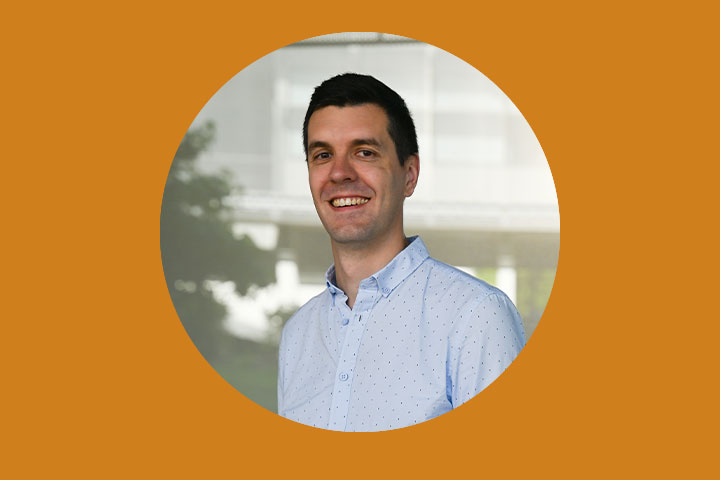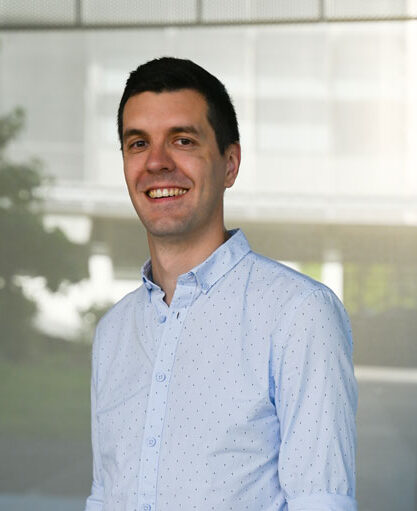
Interview: Florian Pécune
 Since September 2022, Florian Pécune has held a Junior Professorship within the SANPSY unit.
Since September 2022, Florian Pécune has held a Junior Professorship within the SANPSY unit.
Specializing in human-machine interactions and conversational agents, his work lies at the intersection of computer science and healthcare.
Bordeaux Neurocampus: What was your background before joining SANPSY?
Florain Pécune: During my Master’s degree in cognitive science at Paris 8 University, I was particularly interested in a course on animated conversational agents, small virtual characters that interact with humans. I then did an internship in the laboratory of the professor who had proposed this course, and I loved the subject, the atmosphere and the assignments. I was then invited to do my Ph.D. thesis under the supervision of Catherine Pelachaud at Telecom ParisTech. I really appreciated the supervision and the scientific content, which consisted in creating a group of virtual agents capable of accompanying humans in their daily lives. The aim was to understand how humans think, interact and help others, and then transpose this way of thinking into a robot or virtual character.
After my thesis, I completed a post-doctorate at Carnegie Mellon University (CMU), a leading institution in the field of Natural Language Processing (NLP) and Machine-Learning.
Then I went to Glasgow University to work on a conversational agent aimed at changing people’s eating habits by encouraging them to eat more healthily.
After Glasgow, I spent a year and a half at Waseda University in Tokyo, Japan, where I worked on an animated conversational agent designed to help Japanese students learn English. The system had to learn in real time the interlocutor’s level of English to suggest appropriate exercises.
Can you give us an example of your work on conversational agents?
At Carnegie Mellon University, for example, we worked on the “inMind” project in collaboration with Yahoo! The aim was to create an animated conversational agent capable of recommending films while building a relationship with the user to build loyalty. The aim of my work was to build rapport between the conversational agent and the user, while optimizing the success of the task entrusted to the movie recommendation system.
What really interested me was the linguistic aspect: identifying the conversational strategies that humans use every day to build rapport (e.g. sharing personal information, making a joke or voicing a criticism). Once these strategies had been identified, it was necessary to determine how the agent would recognize whether the user was employing them in the interaction, based on linguistic, semantic and syntactic information, estimate in real time their impact on rapport, and generate an appropriate verbal and non-verbal response. This is where natural language processing comes into play, with tools such as the large language models (LLMs) on which ChatGPT is based.
What are your missions at SANPSY?
The unit has developed the Kanopée mobile app, which enables users to evaluate their sleep and their consumption of tobacco, alcohol and screens. The idea is to improve this app to make it as effective as possible and keep users engaged on the long run. In a way, that’s my main mission.
We’re also working on integrating the user’s voice, which can be used to detect things like drowsiness or depression. The idea is to understand how voice interaction can be integrated into the application to best help patients without detracting from their user experience.
What’s interesting is that the healthcare field is very specific, so some of the knowledge I’ve acquired during my career isn’t necessarily applicable. This prompted me to change my point of view and delve into a field I knew nothing about: psychiatry and mental health. I work with doctors, psychiatrists, psychologists and, above all, patients, which forces me to fundamentally adapt my research issues.
There are a lot of interesting things going on around me, with many projects and people with whom I collaborate. I’m impressed by the demand for skills like mine, particularly in computer science and machine learning, in the healthcare field. So there are a lot of very ambitious projects and collaborations going on.
How do you see the digital health sector developing?
Digital medicine seems to be a buoyant field, and I think there’s a huge need to integrate people with IT skills into this medical world. Digital imaging, for example, can already help detect cancers and other health problems, but there’s still a huge amount of data just waiting to be analyzed.
One of the difficulties is that doctors and computer scientists don’t necessarily share the same codes or the same language. We therefore need to create more bridges between these two fields to facilitate collaboration. Our challenge is to facilitate the work of doctors by creating tools capable of acting as intermediaries with patients, giving them access to information they simply couldn’t have until now.
However, how this information will be interpreted by doctors remains uncertain, and is one of our main research questions.
For the time being, we are focusing on the general public, who will manage the use of the application themselves. Its integration into today’s healthcare system is more complex and raises societal issues, particularly everything to do with GDPR (General Data Protection Regulation), ethics, security.
These are more global issues linked to IT data. I think we’re only at the beginning.
With the rapid and massive adoption of tools like ChatGPT, these societal questions are once again coming to the fore. What’s your take on it?
I find it incredible how well ChatGPT works. When I see the progress made in the last couple of years, I wonder what we’ll have in 5 years’ time. Will we reach a point where we can’t do any more?
There are ethical and ecological aspects to consider, but there are also exceptional applications that can emerge thanks to these tools, So I’m aware that there are problems that absolutely must not be overlooked, but I’m not in favor of stopping these advances.
Do you think your profession will evolve with these technological advances?
Yes, completely. In the past, I wanted to create improved versions of chatbots like ELIZA, which was designed in the 60s. But now with ChatGPT, I see that things are evolving very rapidly: it’s complicated to compete with giants like Google or META. But I can try to frame, understand and adapt these tools to a specific audience. That’s how I see my job, focusing less on the technological aspect and more on understanding the needs and desires of doctors and patients.
Last update 07/09/23
